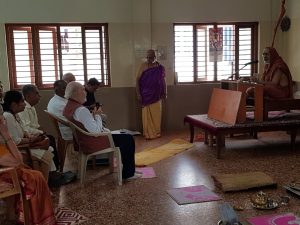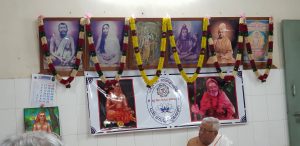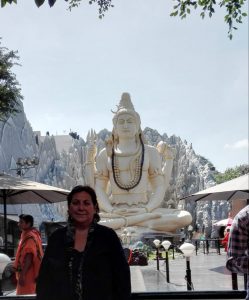M. Thank you for your well-argumented comment. Empirical science is one thing; philosophy another. Other than Monism there is Non-duality (‘not-two’). Ultimately there is no essential distinction between matter and consciousness which latter, logically and epistemologically, is prius; equally, no distinction between subject and object, observer and observed. The existence and reality of consciousness, which is independent of all phenomena, doesn’t need a proof. Continue reading
Category Archives: Martin
Debate with a crypto-buddhist
‘How many of you agree with the theory that our consciousness ends when we die?’
A commentator: (There’s of course nothing called ‘Soul’ of a person that goes on to live forever in afterlife. I’m an atheist. I person believe that when we die, our brain and the entire body shuts down, and we meet an end. Those of us who experienced anesthesia knows how it feels when our brains are inactive.)
M. I for one do not agree. Bodies decay and die not so consciousness. The whole is greater than the part, and that whole can be called ‘life’, ‘existence’, or ‘consciousness’ – none of it reducible to the physical or material. All bipolar concepts, such as life-death, good-bad, one-many, mind-body, ‘you and I’ (‘me and the other’) are false in themselves– just concepts. There is only totality (‘what is’), namely, existence or being – not many existences (existents), but one existence; not many loves, but one Love . And all of us are in essence, that is, in reality, existence and love – they are not ‘two’ (love being Plato’s ‘higher Eros’ or desire) once plurality is ‘seen’ for what it is: a deception or narrow vision. Continue reading
Is it possible to live without technology?
How possible would it be for you to live without Technology? (From Quora)
My answer: A given individual can live without technology – telephone, radio, TV, automobile – but society in general can no longer go back (how far back?) to the time of 3 or 4 generations ago. Everything has been ‘piling up’ and become more and more complex and, at the same time, integrated or intertwined more or less haphazardly. We need modern technology even if only to take us out of this mess – a mess which I don’t need to describe in any detail and which affects the whole world.
Are we at the point of no-return? Nobody knows. While there are dangers, there are also opportunities, advances and turn-backs. Each individual is like a cog of a great machine (or a thread in a tangle?), and only individuals can bring about some change for the better – others do it for the worse. It is like the ancient lore of good and evil in endless battle. The myth of Prometheus (and also that of Pandora) loom over all of us. The Greeks understood all this very well.
‘Advaita Vision’ is an antidote.
Experience vs. Knowledge
Q. ‘Is finding true self also a feeling or emotion?’ Quora
SK. Emotions and feelings are deeper than thoughts. Attachments and aversions are deeper than emotions and feelings. True self is deeper than attachment and aversions. Even though some people think of it as feeling or emotion, in reality it is much deeper than just that. The reality of true self only comes with direct experience of prolonged practice of consistent meditation for a long period of time. Continue reading
Trip to India – 4

Sw-s Subraya Sharma, Ramachandra Iyer & Sowmya
The Adhyatma Prakasha Karyalaya was founded by Swamiji [1880-1975] in 1920, its first location being Bangalore, which has persisted, but reduced in size in comparison with the next location: It then became well established in 1937 in Holenarsipur, 1 and ½ h. from Bangalore, where he spent his last years. Swamiji’s intention was to publish the works of Shankaracharya along with those of Gaudapada and Suresvara, all of those that are based on Prasthanatraya. His own extensive work has also been published there, as well as several journals – in Sanskrit, Kannada, and English. Continue reading
Trip to India – 3
On the third day Sowmya, my wife and I went over to Ramachandra’s house and he accompanied us to visit Subraya Sharma. Ramachandra Iyer, a saintly swami with a persistent gentle smile in his face and of few words, is someone you can be quite at ease with in company, so unobstructive and unassuming is he. Sowmya (I was told) calls him ‘uncle’, even if there is no blood relationship between them. He has just turned 72 years of age and lives with his wife, one son and his wife, and two young and sprightly grand-daughters.
At Subraya Sharma’s home (he is the one who took care of Swamiji for 16 years of the latter’s life) we were offered milk in a small glass and some granulated sugar (one was supposed to drink the milk and swallow the sugar after putting it in the palm of one’s hand and may be grind it between one’s teeth before swallowing – this is what I did). Continue reading
Trip to India – 2
As I wrote in part l of this Travelog, I never expected that I would be talking on three occasions in front of an audience and in three different locations. Before departing to India I had asked Sowmya (a 29 years old MD and accomplished Advitist) what could I talk about if the occasion arose, assuming that there would be at least one presentation I should be making. Sowmya told me that the topic could be the article I wrote (published serially in Advaita Vision in 2017) in defense of SSSS (‘Swamiji’ henceforth) which took me so long to write – 16 pp long vs. the 40 pp of the article by Ramakrishnan Balasubramanian. Continue reading
Trip to India
Trip to India – l
(Don’t expect here a sequel to ‘A Search of Sacred India’, by the well-known author Paul Brunton)The thought of going to India came to mind – despite my advancing age and unsteady gait- through the contact with a user of Quora with whom I had been relating quite well through that medium. There are a number of such users who are either followers of the great Vedantin of the past Century, Shri Satchidanandendra Saraswati, or acquainted with his writings. Through that contact I learned that two Swami-s who took care of SSSS, one of them during the last 16 years of his life and the other during the last year (1975) were still alive and living in Bangalore, the city where my contact, Sowmya, lives (there must of course be other close followers of that sage in other areas of India, but we are now talking about Bangalore (or Bengaluru, as recently renamed) and some of the people who live there. With the indispensable help and support of my wife, we took to India without thinking it twice. Continue reading
1. Metaphysics – 2. Is Advaita a trap?
- If metaphysical entities cannot be verified to exist, how can we say anything meaningful about them?
My position is that everything is metaphysical – cf. Is everything metaphysical? www.quora.com/search?q=everything+is+metaphysical
(Originally answered in Quora)
So, everything that exists is metaphysical, including language and thought: sticks and stones, trees, all bodies, etc.; IOW there is nothing that is ‘material’ or physical per se (which is a pure abstraction, or a metaphysical theory*). Language divides ‘what is’, the whole of existence, into parcels having particular meanings which, having specific referents, are not purely verbal or conceptual (i.e. language constructions), but are based on particular experiences. The experiences are either sensorial, purely mental or intellectual (thought, emotions), or intuitive, transcendental or spiritual, that is, transcending the mind; these last being metaphysical properly so called, for example pondering about, contemplating the nature of the universe, of matter, time, space, the nature of life, of origins or causality, ‘subject-and-object’, ‘value’, consciousness, mind, the meaning** of ‘soul’ or individuality (plurality). Pondering about the nature of experience and what may be called nonduality is intellectual as well as metaphysical or spiritual – this is not a neat distinction; the scope is what counts here.
*Metaphysical theories, being the product of thought (and language), are metaphysical themselves, it goes without saying. Their import or thrust “in the scheme of things” is something else.
**‘Meaning’ (a word or concept – or question mark in the mind ), merges here with its referent, ‘the thing itself’, by an act of intuition or comprehension.
- Is Advaita a trap?
Yes, it is a trap for individual mind – that is, the mind that considers itself a separate and independent individual, a doer and enjoyer. After usually many years of seriously studying Advaita (emphasis on ‘seriously’) with full force and dedication, it may dawn on that mind that the belief described above was actually a trap and a lie. Realizing this, by a stroke of magic as it were (so one might think without straying much from the truth), BINGO! you are free… free from the mind’s doubts, fears, hopes, projections and tribulations. You then realize that only universal consciousness (a.k.a awareness) is true, and that that is what You are —the quotidian mind has disappeared, become no-mind, that is, pure unalloyed consciousness.
https://www.quora.com/Is-Advaita-a-trap/answer/Alberto-Mart%C3%ADn-2
1) Knowledge and the Vedas; 2) Is everything metaphysical?
Do the Vedas really contain any advanced knowledge as so many people claim they do? (Quora)
I would say the Vedas contain the most fundamental and ‘advanced’ knowledge there is, though usually portrayed in the form of paradox (analogy, metaphor, story, etc.), so that one has to crack the code in order to find the wealth hidden in them. That knowledge is not like empirical science, which is cumulative and provisional, and can be said to be somehow contained in the latter, even if in embryonic or potential form. That knowledge or perspective is metaphysical rather than mystical. According to the Vedas there is one and only reality: consciousness (brahman, the Absolute, etc.), which pervades the whole universe; it is immanent in it as well as transcendent… “the smallest of the small, the largest of the large”. It cannot be measured or understood by the mind, for which it is ineffable, but it is that by which the mind comprehends… it cannot be expressed in words but by which the tongue speaks… it is eye of the eye, ear of the ear, mind of the mind, as expressed in the Upanishads.
Modern physics is having a hard time trying to explain away what consciousness is in terms of physical phenomena (neuronal activity in the brain), but consciousness is not an irreducible phenomenon or datum; it is reality itself, everything being comprehended in it (theories, doubts, projections, emotions, things, thoughts, intelligence, observer and observed, you and I). For the Vedas reality is one, and present physics is trying to find out in which way it is so (‘theory of everything’, ‘unificatory theory…’). Not all physicists are reductionist, some of them having seemingly mutated into philosophers with an understanding of the core of Vedic teachings.
…………………………………………………………………….
Is everything metaphysical? (Quora)
‘Is everything metaphysical?’ My answer is a resounding Yes! despite the widely accepted, prevailing, physicalist theory: everything is reducible to matter/energy. This last position is being insistently questioned ever since the rise of the new physics (the role of the observer, uncertainty principle, etc.). Nobody knows what matter is intrinsically, and why an atom is an atom – its nature is a mystery; scientifically we can only talk about mechanism, ‘behavior’ or function, in relation to physical processes. Thus, everything is metaphysical – including tables and chairs or, rather, the material they are made of, wood (hilos) – which means non-reducible to the physical. Psychology, mind, selfhood are equally non reducible to the physical – nor are they purely mental or purely conceptual – , thus they are metaphysical, however psychologists may protest. ‘Man’, ‘personhood’, are metaphysical or philosophical notions.
Metaphysical doctrines are couched in LANGUAGE (concepts, plus logic and reasoning -tarka), which de facto is dualistic, but that is a springboard and a conditio sine qua non for realization or uniting with the TRUTH or REALITY which is indivisible, non-relational, and inexpressible by the mind (anubhava).



